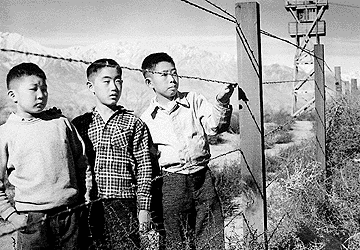The attack on Pearl Harbor, along with growing anti-Asiatic sentiments, fueled America’s distrust of the Japanese. In fact, the country became so paranoid that it began to consider American citizens of Japanese descent potential threats to national security. In 1942, the War Department ordered the internment of 1,444 Hawaiian Japanese-Americans and about 110,000 Japanese Americans living on the West Coast. These people were evicted from their property, ordered to bring only what they could carry, and shipped to prison camps even though there was no evidence of their disloyalty or subversion. Though the situation in the United States was not nearly as horrific as in Europe, the mass relocation and imprisonment of Japanese Americans bore some resemblances to the Nazis' treatment of Jews during the Holocaust. As Ms. Niizuma pointed out, internees ate out of German-made bowls--a haunting reminder of these parallels. It was also shocking that two-thirds of these internees were Nisei—people born in the country to immigrant parents. To these Nisei, it was disturbing and insulting that they were under suspicion, because their allegiance was with the country they were born and raised in: the United States.
on Pearl Harbor, along with growing anti-Asiatic sentiments, fueled America’s distrust of the Japanese. In fact, the country became so paranoid that it began to consider American citizens of Japanese descent potential threats to national security. In 1942, the War Department ordered the internment of 1,444 Hawaiian Japanese-Americans and about 110,000 Japanese Americans living on the West Coast. These people were evicted from their property, ordered to bring only what they could carry, and shipped to prison camps even though there was no evidence of their disloyalty or subversion. Though the situation in the United States was not nearly as horrific as in Europe, the mass relocation and imprisonment of Japanese Americans bore some resemblances to the Nazis' treatment of Jews during the Holocaust. As Ms. Niizuma pointed out, internees ate out of German-made bowls--a haunting reminder of these parallels. It was also shocking that two-thirds of these internees were Nisei—people born in the country to immigrant parents. To these Nisei, it was disturbing and insulting that they were under suspicion, because their allegiance was with the country they were born and raised in: the United States.
Throughout the process, Japanese Americans fought for their rights. In Korematsu v. United States, however, the Supreme Court justified the confinement of Japanese Americans to internment camps as a military necessity. This lamentable breach of justice did not deter the Japanese Americans: after the war, they formed the Japanese American Citizens League (JACL) and eventually convinced Congress to spend $38 million to compensate for the lost property. Later, in 1978, President Reagan authorized a bill delivering $20,000 in reparations to each surviving individual who had been imprisoned in relocation camps. Nonetheless, this monetary compensation amounted to only a fraction of the losses Japanese Americans suffered during relocation, which included lost property, terminated businesses, and emotional trauma. In 1990, fifty eight (58) years after the relocation, President George H.W. Bush issued a formal apology for the heinous violation of the 14th Amendment, in which he stated, "We can never fully right the wrongs of the past. But we can take a clear stand for justice and recognize that serious injustices were done to Japanese Americans during World War II."
By Vivek C. and Jesús G.

Great job going into a lot of detail about the concentration camps. It was especially interesting reading about the Japanese American Citizens League and the compensation the japanese got.
ReplyDelete